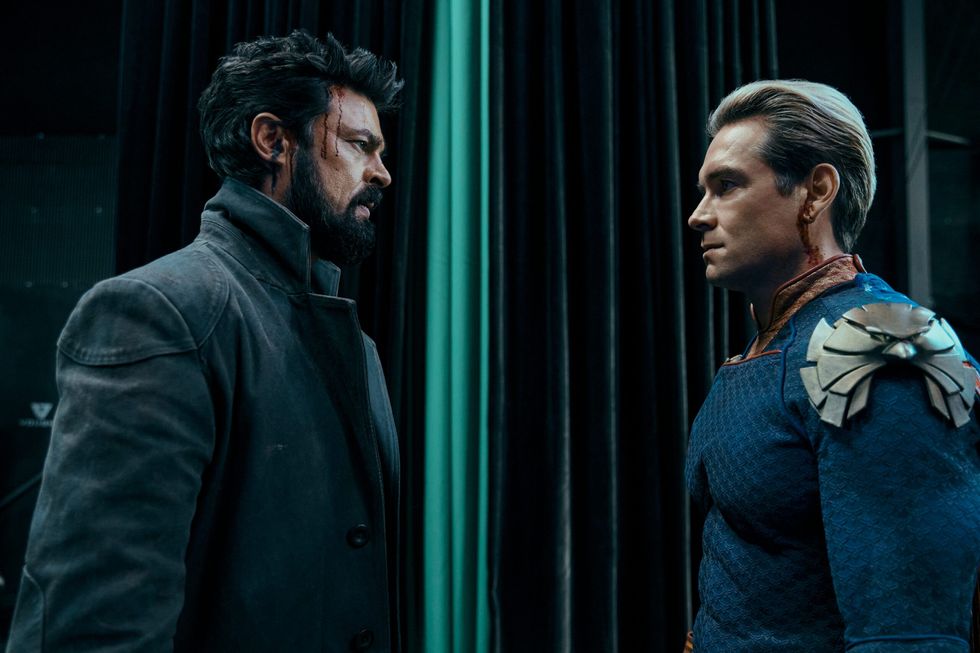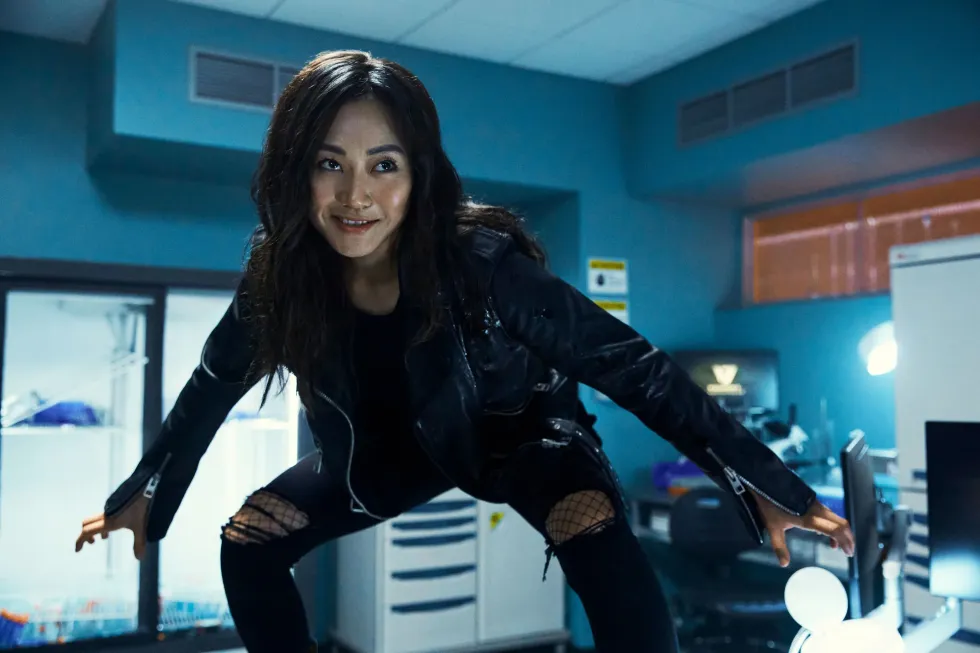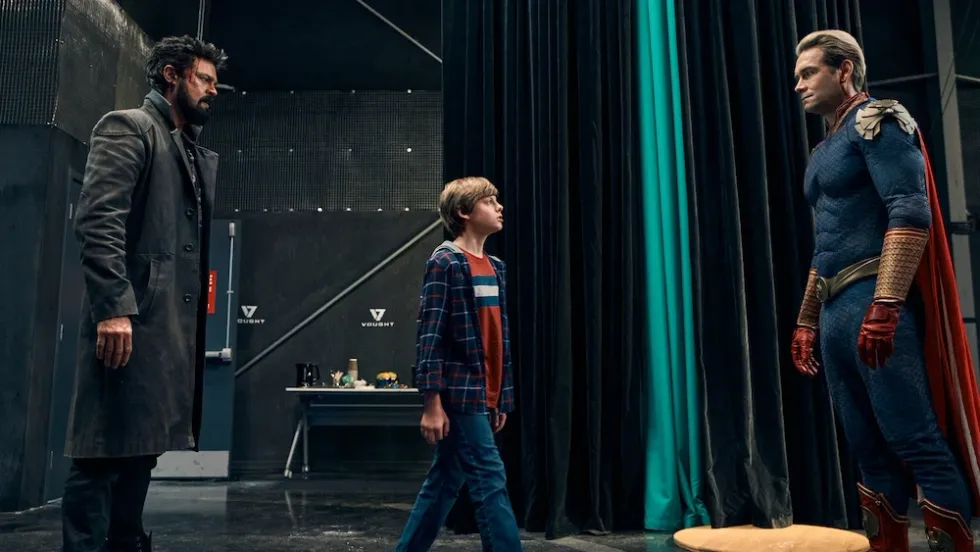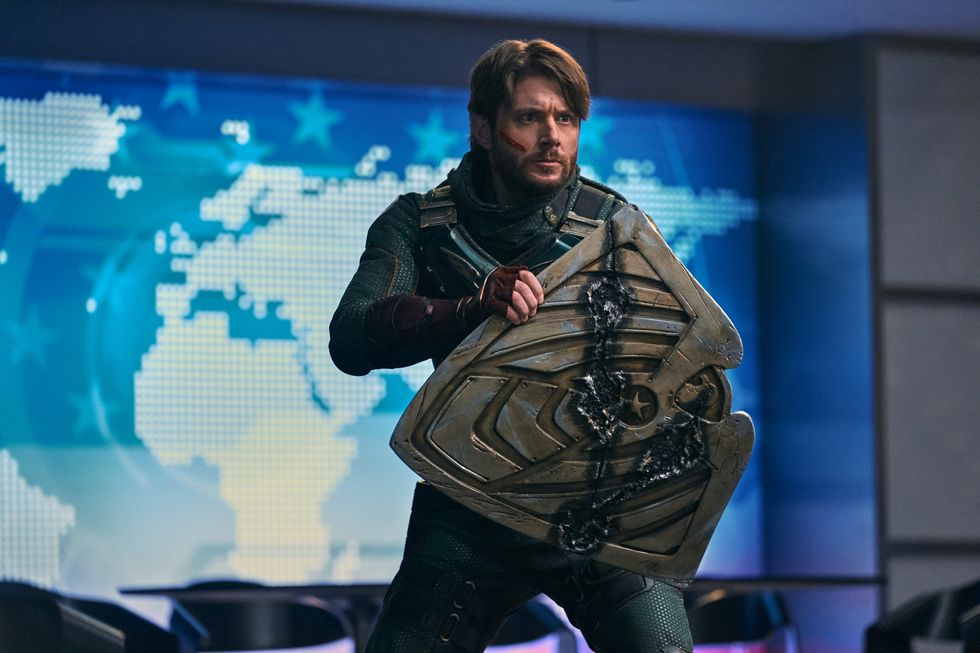
Prepare to be entranced by the audio sorcery that breathes life into The Boys… and beyond.
Wade Barnett, MPSE, knows how to create sounds for the otherwordly. What does a megaton punch sound like? What about multiple bones breaking, a young woman levitating with electricity, or a frenzied crowd cheering on a power-hungry superhero? Barnett and his team know, and his wizardry in sound editing has ensnared audiences and fans of The Boys.
This audio maestro’s remarkable talent and dedication to grounded storytelling have not only earned him widespread acclaim but also a coveted Emmy nomination for Outstanding Sound Editing for a Comedy or Drama Series. His nominated episode is the Season 3 finale, “The Instant White-Hot Wild,” an episode that contains multiple fight scenes as well as some quiet, dangerous confrontations.
We spoke with Barnett via Zoom to explore his artistic journey and the creative processes that led him to this prestigious nomination.
THE BOYS – Season 3 Official Trailer | Prime Video
www.youtube.com
Editor’s note: The following conversation has been edited for length and clarity.
No Film School: I would love to know your path into the industry, how you got into sound.
Wade Barnett: In college, I did study broadcast production at the University of Colorado, but, to be honest, I didn’t really know what I wanted to do with it at that point. I grew up playing in bands, and I wanted to learn about audio production. I mean, really, what I wanted to do was work in a recording studio at that time, and at the University of Colorado, that was kind of the closest thing that they had was teaching you pro tools and the audio editing software.
After I graduated, I came out to LA, did some internships at recording studios, then did a year-long technical audio engineering program that was only on sound and audio engineering, and learned a lot there. I probably learned more there in that one year than I did in the entire four-year undergraduate program. In that program, I learned about post-production sound editing. I hadn’t really known much about it, to be honest.
Growing up, I loved film, and I loved television, but I never realized what sound editors were, what they were all about, or what that profession really was until I went to audio engineering school. Then my focus shifted, at that point, from music production to sound design, sound editing, and all that kind of stuff.
NFS: That’s awesome. So you did have a formal background, but then you got experience more in the doing.
Barnett: Yeah, I mean, it kind of worked out, because on paper, I’m working in the field that I studied in college, but to be honest, it was kind of a coincidence.
 ‘The Boys’Credit: Amazon Prime Video
‘The Boys’Credit: Amazon Prime Video
NFS: Your show, obviously, is a very visceral superhero dramedy, and there are a lot of unique challenges that come along with that.
Barnett: Every new season, we have new characters that we have to do the sound design for. The main thing is working with our showrunners and producers, and figuring out what those sounds are. Because it’s very subjective. One thing that we really work hard on, because our showrunner, Eric Kripke, who we work very closely within the sound design process, is just making those sounds sound organic, and sound like they come from somebody’s actual body, or from something actually that exists in the world, and not something that’s just created on a synthesizer, or something of that nature.
That’s really the main goal. One of the other things that we spend a lot of time on is just big crowd scenes, and when you have a lot of music going, and there are really big crowds, and also dialogue that you really have to hear. Those kinds of scenes take up a lot of time [because] so many different food groups playing all at once.
NFS: You probably are aware, the end of the episode was a popular TikTok sound for a long period. A very rich soundscape that ended up being very viral.
Barnett: Yeah, that’s the Homelander kind of chuckling and the strings kind of going—yeah. Oh, my God, there were so many good memes. Yeah, [Antony Starr] is so powerful in his acting.
NFS: I was really curious about how you make all of it sound so real. Like, the punches are more powerful than a normal punch would be, but it still sounds organic, as you said. So how do you keep it grounded?
Barnett: Yeah, it’s a fine line. Because we do want the superheroes’ punches and stuff to sound a little bit larger than life. So it’s just about layering, really. It’s just not one or two sounds; it’s more about maybe seven or eight per punch, and just having different types of sounds. A lot are more low-end, and if you heard them by themselves, they probably wouldn’t be very interesting, but then you maybe have some that have a little more crunch to it, depending on what it is. If it’s a knee sound, it’ll probably have more low-end; if it’s a punchy head punch, maybe it has more of a bone crunch sound to it.
It’s about layering sounds, and making sure that you have all the different frequency ranges in there to play with on the stage.
 ‘The Boys’Credit: Amazon Prime Video
‘The Boys’Credit: Amazon Prime Video
NFS: You also mentioned Eric Kripke. I would love to know what that collaborative process looks like.
Barnett: Eric’s awesome. He’s super hands-on. He really wants to be a part of this sound design process, and different showrunners are different. Some of them kind of want you to just handle it on your own, and then they’ll give notes on the mix stage, and we do lots of sound design reviews with Eric. It all starts with a spotting session, or, in earlier seasons, even before that, we would where we’re working off of pre-visual animations, but, at this point, it starts at a spotting session, where we watch the episode, and he tells us what he wants. A lot of times, he has very distinct things that he wants us to try, and then, in other instances, he’ll let us try a few options, and then he’ll give notes.
It’s very collaborative, it’s very hands-on, and we do a few different design review passes ahead of the final mix. So once we get to the final mix, most of the time, it’s just kind of tweaking levels against the dialogue, or the music, or whatever else is sonically happening in the scene. Sometimes, he’ll ask for little changes and stuff, because of visual effects updates, or just a new idea, maybe, they don’t want us to try, but he’s very hands-on, and he’s super cool, and he really gets us to push the limit with all the gore stuff, which is great, because a lot of showrunners would be timid about that kind of thing, and he’s not, which is awesome.
NFS: Not to sound morbid, but another thing that I really enjoy about the show is just how it goes for it, in so many ways.
Barnett: A hundred percent. Yeah, we are encouraged to push the limits with all the sound stuff to accompany what you see on the screen, which is pretty incredible and gory.
NFS: How much time are you working on each episode?
Barnett: It varies between episodes. Well, it’s hard to say, because it’s really spread out, usually, probably about a month per episode, give or take, but sometimes, you start one, then you get some changes, then you go back, and you recut some stuff. A lot of the visual effects come in late, or updates, so it’s hard to kind of quantify because you’re kind of putting a pin in some things, and then coming back to them later, yeah.
 ‘The Boys’Credit: Amazon Prime Video
‘The Boys’Credit: Amazon Prime Video
NFS: What was your favorite sequence to work on in this episode?
Barnett: The big battle royale kind of at the end was really cool because we have different fights going on in different rooms. We start off with Ryan, Soldier Boy, Homelander, and Butcher, who are kind of all fighting, and then they go off to another room, and Soldier Boy is fighting Butcher, then Maeve’s fighting Homelander, then Kimiko’s in a totally different area fighting these military guys with an iPod with the music playing, which is a super cool sequence.
Going back and forth between all of those was just really fun, and it played really well. Then, having the whole buildup of Annie kind of building up her power, and levitating, or flying for the first time was pretty fun, yeah.
NFS: What are some beginner mistakes that you see people making that you would advise them to avoid?
Barnett: A lot of sound editors tend to over-cut stuff a lot. A lot of times, it’s really hard because when you have so many different options in your sound library, it’s really easy to just give a lot of different options and stuff to the mixers, but when the mixers have so much to do and so many sounds to work with. Having too many sounds, it can be problematic. So you don’t want to overwhelm them with sounds, options, and stuff like that. So it takes a lot of discipline to make the right decisions, basically, with the sounds that you choose to help drive the story, and to help make whatever point you’re trying to make sonically.
Make the right decision, and don’t over-cut. Don’t send too many options to the stage because it can get convoluted.
 ‘The Boys’Credit: Amazon Prime Video
‘The Boys’Credit: Amazon Prime Video
NFS: What advice would you give to someone wanting to get into your field?
Barnett: Be patient. Try to take as many jobs as you can. Ask as many questions as you can. Don’t be afraid to ask questions. Try to find somebody who’s open to talking and helping, and ask them questions. Don’t be annoying, but it doesn’t hurt to be persistent. When I was first starting out, I did a ton of student short films, you know what I mean? Made a lot of mistakes. The more you do, the more you learn. Try to get your hands on material from people that are willing to share, and study it.
NFS: My impression is that people in your field are very open. Is that a pretty good assessment, in terms of wanting to help, and wanting to share those types of resources?
Barnett: As long as they’re not too busy, I think so. Some of them are a little more secretive. You have to find the right people. Some people are very secretive about even one sound editor getting ahold of their session because they think that their template, their knowledge, or their way of cutting is super unique. A lot of times, it is and they don’t want anyone buying their style or anything like that. But from a beginner’s standpoint, I think a lot of people are very willing to help.
It’s good to do that when you’re as early as a student, or getting into a post-production company at the ground level. I did a couple of internships while I was still in school, and then my very first pay job was working in a post-production facility just as a runner, and I did that rather late in life. I think I was 27 or 28 [years old], and I went from managing a restaurant, making pretty good money at the time, in the middle of a recession, to making minimum wage. So my parents thought that was an interesting choice, but, within a year, I was in the union and working my way up.
So you have to just stay persistent, and sacrifice a year or so, and hopefully, you can start getting some gigs that pay the bills.
NFS: And some Emmy nominations!
Barnett: And some Emmy nominations.
Author: Jo Light
This article comes from No Film School and can be read on the original site.
